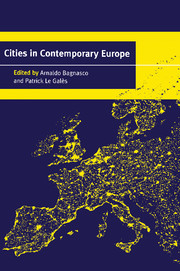Book contents
- Frontmatter
- Contents
- List of figures
- List of tables
- List of contributors
- Preface
- Introduction: European cities: local societies and collective actors?
- 1 European cities in the world economy
- 2 Spatial images of European urbanisation
- 3 Segregation, class and politics in large cities
- 4 Social structures in medium-sized cities compared
- 5 Different cities in different welfare states
- 6 Social movements in European cities: transitions from the 1970s to the 1990s
- 7 The construction of urban services models
- 8 Private-sector interests and urban governance
- References
- Index
7 - The construction of urban services models
Published online by Cambridge University Press: 12 October 2009
- Frontmatter
- Contents
- List of figures
- List of tables
- List of contributors
- Preface
- Introduction: European cities: local societies and collective actors?
- 1 European cities in the world economy
- 2 Spatial images of European urbanisation
- 3 Segregation, class and politics in large cities
- 4 Social structures in medium-sized cities compared
- 5 Different cities in different welfare states
- 6 Social movements in European cities: transitions from the 1970s to the 1990s
- 7 The construction of urban services models
- 8 Private-sector interests and urban governance
- References
- Index
Summary
The notion that urban government and institutions can co-ordinate the development of large metropolises is today questioned by a threefold argument concerning: (a) their capacity to run large and complex metropolitan areas; (b) the role of markets and firms; and in more general terms; (c) the very principle of the possibility for strategic action.
Nineteenth-century political thinking, which generated local government in every European country, developed against a background of the existence of a degree of unity between production, exchange and sociability. However, this core feature of a golden age in local government is being called into question by the rising mobility of trade and population and by the appearance of a space proper to each of these elements: spaces for work, consumption, leisure, family. In place of a one-time spatial and political totality, a differential territoriality has come about with a retroactive effect on urban politics. Firstly, too many communes and authorities are responsible for various problems. City government has become overcomplex and thereby entails operation costs – transaction costs, for economists – as well as less control over decision-making on the part of those holding office (who are hardly in control of the complicated links they have set up). The result is a loss of understanding for the population at large (Lorrain 1989; Le Galès 1995). Secondly, it is by no means certain that these questions are best treated at the level of communes whose unsuitableness is conspicuous when it comes to the management of urban networks and the large technical systems. These strike across territories. Experts talk of discrepancy between functional and institutional territory (Offner and Pumain 1996).
- Type
- Chapter
- Information
- Cities in Contemporary Europe , pp. 153 - 177Publisher: Cambridge University PressPrint publication year: 2000
- 1
- Cited by



